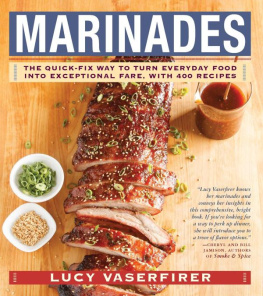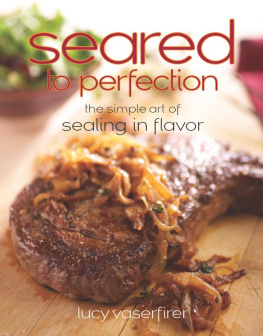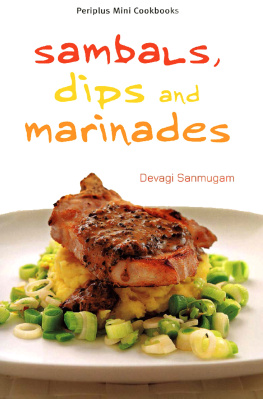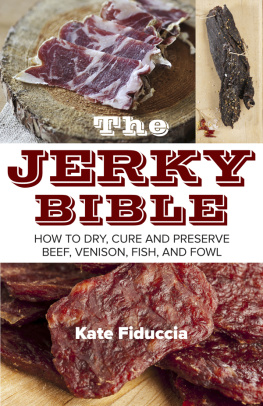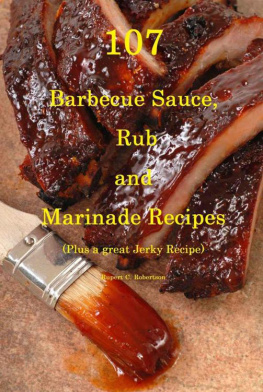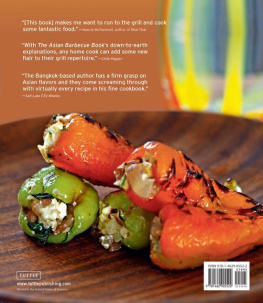The Harvard Common Press
For information about permission to reproduce selections from this book, write to Permissions, Houghton Mifflin Harcourt Publishing Company, 215 Park Avenue South, New York, New York 10003.
www.hmhco.com
Text and photographs copyright 2014 by Lucy Vaserfirer
All rights reserved. No part of this publication may be reproduced or transmitted in any form or by any means, electronic or mechanical, including photocopying, recording, or any information storage or retrieval system, without permission in writing from the publisher.
Printed on acid-free paper
The Library of Congress has cataloged the print edition as follows:
Vaserfirer, Lucy.
Marinades : the quick-fix way to turn everyday food into exceptional fare, with
400 recipes / Lucy Vaserfirer.
pages cm.
Includes index.
ISBN 978-1-55832-827-3 (pbk.)
1. Marinades. I. Title.
TX819.M26V37 2014
641.7dc23 2013036547
Special bulk-order discounts are available on this and other Harvard Common Press books. Companies and organizations may purchase books for premiums or resale, or may arrange a custom edition, by contacting the Marketing Director at the web address above.
Cover recipesFront: Grilled Baby Back Ribs in Asian Plum Marinade,
PHOTOGRAPHY, FOOD STYLING, AND PROP STYLING BY LUCY VASERFIRER
e ISBN 978-1-55832-828-0
v1.0314
DEDICATED TO
EVERY HOME COOK
WHO NEEDS A LITTLE
INSPIRATION SOMETIMES
MAKING MARINADES
MARINADES MAKE THE MEAL
Wouldnt you love knowing at the end of a busy day that something delicious and homemade is already started for dinner?
Well, with the investment of just the few minutes it takes to blend a handful of ingredients into a marinade, you can have just that. While youre out making the most of your day, doing absolutely anything but worrying about whats for dinner, your chicken breasts, steaks, or chops are hard at work absorbing tons of delicious flavor. Dinner practically cooks itself; you just have to move it to the grill. Its that easy. Its that quick. Its that delicious, and theres that much variety.
Could this be real? Wouldnt it be easier to just have takeout? Trust me when I say that marinades are the ultimate in convenience cooking. And yet the flavors are bold and vibrant, as if you slaved all day. Just give it a go for one dinner, and youll find yourself making marinated meals night after night and feeling very clever doing it.
Commercially prepared marinated meats are mushy and unappealing and ultimately leave you in the dark about what youre feeding your family. Overpriced bottled marinades taste tired and bland and are loaded with preservatives and unpronounceable ingredients. So how do you get started making your own amazing marinades from scratch? Read on.
MARINADE DEFINED
A marinade is a flavorful liquid in which food is soaked in order to flavor it or, sometimes, to tenderize itor both. Marinades can be thin and runny, they can be thick and have a paste-like consistency, or they can be somewhere in between.
Theres some confusion between the words marinade and marinate, so let me take a moment to clarify the difference:
Marinade is a noun. It refers to the flavorful liquid.
Marinate is a verb. Its what you do with the food when you put it in the marinade.
THE PURPOSE OF MARINADES
FLAVOR
Plain and simple, marinades make food taste fantastic! They add flavor, giving variety and interest to a wide range of foods. This is their primary purpose.
TENDERIZATION
Much has been made of the ability of marinades to tenderize tough meat. Some marinades do have some tenderizing properties, but only when certain ingredients (such as tropical fruit or dairy products) are used, and these properties are quite limited in usefulness. So when it comes to tenderness, you are better off relying on matching the right cut of meat with the right cooking method rather than on marinades.
THE ELEMENTS OF MARINADES
SALTY
The salty element is the main seasoning in the marinade. It heightens and enhances and brings out flavors. Examples include soy sauce, miso, and fish sauce. And of course, plain old salt counts, too.
SOUR
Chefs refer to the sour element as the acid. Acid adds zip to a marinade and has a way of perking up the flavors. Examples include vinegar, verjus, wine, fruit puree and juice (especially citrus), tamarind, buttermilk, sour cream, and yogurt.
Acid can also affect the texture of the marinated food. Its a commonly held belief that acid in a marinade functions as a tenderizer. Generally, however, the reverse is true. Acid denatures or cooks raw proteinyou can actually see this happening when the surface of a marinating protein begins to go from translucent to opaque, and the result is tougher rather than more tender. The exception is dairy products such as buttermilk, sour cream, and yogurt, which are relatively mild acids and do in fact tenderize proteins.
Personally, I dont worry much when Im marinating such dense, tight-textured foods as chicken, beef, and pork because the acid affects only the surface. Seafood, on the other hand, is much more delicate and has an open texture that allows marinades to penetrate deeply; if left in an acidic marinade for too long, fish and shellfish will become tough, dry, and unpalatable.
SWEET
The sweet element balances the salt and acid and facilitates caramelization and browning during cooking. High proportions of sweeteners also make a marinade thick and sticky and tend to act as a glaze. Examples include sugar, brown sugar, honey, maple syrup, molasses, fruit preserves, and soda.
FAT
Fat adds richness and flavor and is a carrier of fat-soluble flavors. It also facilitates cooking and helps prevent marinated foods from sticking to the grill. Examples include olive oil, canola oil, sesame oil, and even coconut milk.
ALCOHOL
Alcohol adds flavor and is a carrier of both water-soluble and fat-soluble flavors. Just a little bit in a marinade will do a lot to amp up flavor. Examples include beer, wine, and spirits.
FLAVORINGS
As the name suggest, this elements only function is to add flavor to the party. Examples include herbs, spices, chiles, fruits, vegetables, onions, shallots, garlic, ginger, mustard, horseradish, coffee, soda ... the list goes on and on.
UMAMI
After salty, sour, sweet, and bitter, umami is the fifth taste. Though its difficult to articulate, the umami element adds savoriness, richness, meatiness, heartiness, brothiness, mouth-fillingness, and just plain deliciousness to a marinade. And interestingly, combining two or more umami ingredients together seems to increase the umami taste exponentially.
Examples include garlic, anchovies, cheese, ketchup and other tomato products, mushrooms, and seaweed. Fermented and aged ingredients such as soy sauce, miso, fish sauce, and Worcestershire sauce are particularly rich in umami.
PROPORTIONS
Every marinade doesnt necessarily include every one of these elements, and many ingredients play the role of several elements at once. For example, soy sauce adds salt, flavor, and umami; wine brings acidity and flavor; sour cream introduces acidity, fat, and flavor; and soda offers sweetness, acidity, and flavor to a marinade.
There is no hard and fast rule or formula to follow for how much of each element to use in a marinadeits more a question of balance and desired flavor profile. But a good jumping-off point for a well-balanced marinade is equal amounts of salty, sour, and sweet ingredients with a glug of oil and the desired flavorings.
For instance, for a classic Asian-style marinade for steak or salmon, I might start with 2 tablespoons each soy sauce, rice vinegar, and honey and 1 or 2 tablespoons canola oil. To that I might add, say, some sake, ginger, and garlic. Then Id taste the mixture, carefully evaluating the balance and flavor to determine if its what I was going for. Id make any necessary adjustments and then taste again before using it.
Next page
